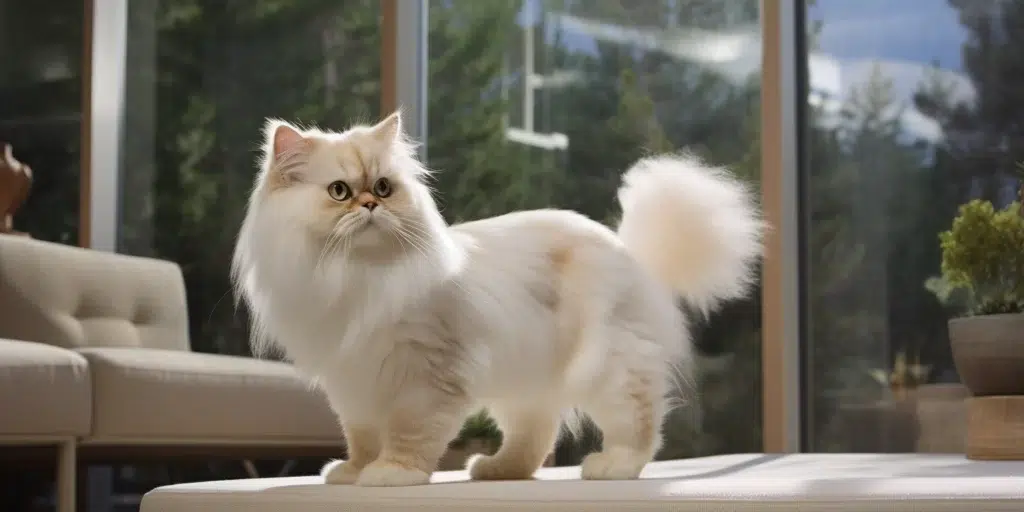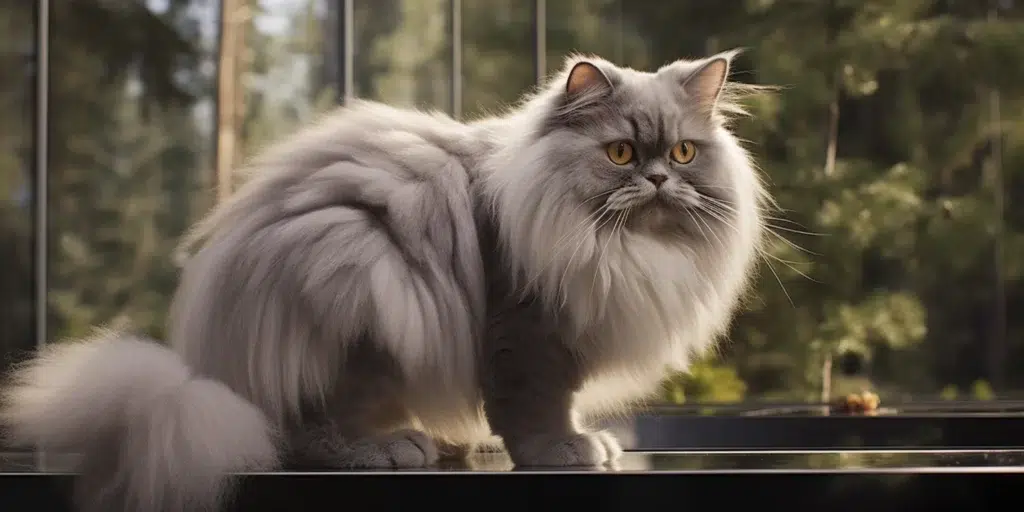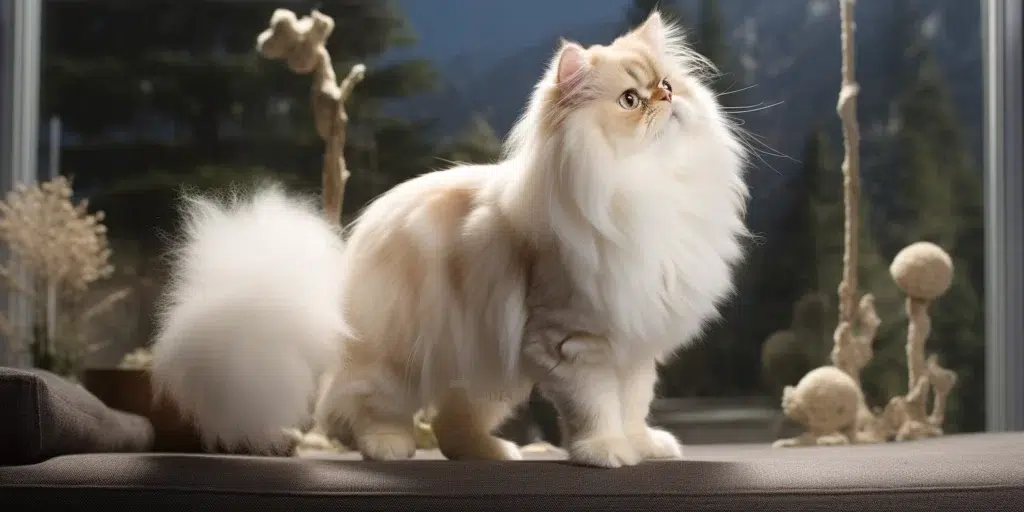Ever wondered how vocal Persian cats really are? These fluffy, elegant felines have a lot to offer, and their voices are just one interesting aspect of their personality.
When it comes to Persian cat noises, there’s a lot to learn and understand. From their soft meows to the occasional purr, every sound has a story.
So, let’s dive in and discover just how talkative these majestic creatures can be!

Are Persian Cats Vocal Cats?
No, not much. While Persian cats can sometimes be vocal, they’re generally known for being quieter compared to other cat breeds. However, like people, every cat is unique and some Persian cats might surprise you with their chattiness. Several factors can influence how much or how little these cats choose to “speak up.”
The gender of a Persian cat might play a small role in its noise level. Male cats, especially those not neutered, can be more vocal than females, sometimes due to territorial instincts or when seeking a mate. That said, this is a minor aspect, as personality often trumps gender in determining a cat’s vocalness.
Just like us, individual Persian cats have their unique temperaments. Some might be more outgoing and chatty, trying to communicate with their humans through meows and purrs, while others might prefer to stay quiet and observe from a distance. It largely depends on their personality and upbringing.
Factors That Influence Persian Cat Noise Levels
Their activity and exercise level can affect their noise level. Cats that are more active or engaged in play and interaction with their family members might tend to be less vocal. They’re too busy exploring and having fun to stop and chat.
On the other hand, a cat that doesn’t get enough stimulation might use its voice more to attract attention or convey boredom.
Their Age
Age is a big factor when it comes to how vocal a Persian cat might be. Kittens are naturally more vocal than adults. They meow to communicate with their mothers, but as cats grow older, they tend to meow less, especially if they notice that meowing doesn’t always get them what they want from their human companions.
In their golden years, Persian cats might become vocal again, but for different reasons. Senior cats might meow more due to confusion, disorientation, or discomfort that comes with age-related conditions. It’s their way of seeking help or comfort from their humans.
Understanding the age-related changes in your Persian cat’s vocalization can help you better cater to their needs and ensure they’re happy and comfortable at every stage of their life.

Feeding Persian Cats and Its Relation to Noise Levels
Meal times can be quite the chatty affair for some Persian cats. They might meow or purr loudly when they know it’s time to eat or if they’re hinting that their bowl is unfortunately empty.
This isn’t limited to Persian cats, as many cats become more vocal around their feeding times, but Persians might do it in a more dignified, less insistent manner.
Staying consistent with feeding schedules can help manage this type of vocalization. It reassures your cat that food is on the way, reducing their need to remind you vocally.
Treats can be a clever way to interact and quiet down a talkative Persian, but they should be given sparingly to maintain a healthy diet.
Persian Cat Exercise Level Affects Their Noise Levels
Activity plays a crucial role in managing the vocal behavior of Persian cats. These serene felines often express their contentment through quiet purring instead of constant meowing.
Engaging your Persian cat in regular playtime can help them use up their energy in a positive way, leading to a quieter and more satisfied pet.
Interactive toys, puzzles, and even simple play sessions with a piece of string can stimulate your Persian cat’s mind and body, making them more relaxed and less likely to voice every thought.
Medical Conditions
Sometimes, increased vocalization in Persian cats can signal underlying health issues. If your usually quiet Persian begins meowing more frequently or loudly, it could be trying to tell you something is wrong. Conditions such as thyroid problems, hypertension, or pain can cause your cat to become more vocal.
It’s crucial to pay attention to changes in your Persian cat’s noises, as they might be the first clue that a vet visit is necessary. Early detection and treatment can help manage any medical conditions and ensure your fluffy companion stays healthy and comfortable.

Persian Cat Noises and Their Meaning
Understanding the different sounds your Persian cat makes can greatly improve the communication and bond between you.
Each noise has its own meaning, and deciphering these can help you cater to your cat’s needs and moods better.
Meow (The Most Common Noise)
The “meow” is the most recognized cat noise, and it’s often used to grab your attention. Persian cats might meow when they’re hungry, want to be petted, or simply to greet you. It’s their way of saying, “Hey, look at me, please!”
Purring (The Most Enjoyable Cat Noise)
Purring is that magical sound that signifies contentment, relaxation, and happiness in cats. When your Persian cat purrs as you pet them, it’s a sign of their trust and enjoyment in your company.
However, it’s worth noting that cats sometimes also purr when they’re in pain, as a self-soothing behavior.
Hissing (Your Cat Feels In Danger)
Hissing is a clear sign your Persian cat is feeling threatened, scared, or uncomfortable. It’s their way of saying, “Back off!” If you hear this, it’s best to give your cat some space and figure out what’s causing their distress.
Yowl (Not a Happy Meow)
A yowl is a longer, drawn-out sound that can indicate your cat is in some form of distress, perhaps due to loneliness, discomfort, or seeking a mate. If your Persian starts yowling, it’s time to pay extra attention to their needs.
Growls (Not as Scary as a Tiger)
Growling in cats, including Persians, is a warning sign. It might be directed at other pets or situations they’re unhappy with. It’s their way of saying something is wrong, and they’re not afraid to voice it.

Some Cats are More Talkative Than Others
Personality plays a huge role in how vocal a Persian cat can be. While the breed is known for being on the quieter side, don’t be surprised if your Persian pal ends up being a little chatterbox. The environment, upbringing, and even the relationship with their human can encourage more vocal expressions.
How to Make Persian Cats Less Vocal?
If your Persian cat’s chatting becomes too much, consider engaging them in more playtime and ensuring their needs are met before they feel the need to vocalize them. Understand the cause of their vocal behavior can help you find the right approach to reducing unnecessary noise.

Conclusion
Persian cats may not be the most vocal breed, but they certainly know how to make their presence and needs known. Understanding the nuances behind their noises can help you build a stronger, more empathetic relationship with your fluffy friend. Remember, every Persian is an individual, and learning to speak their language will make your journey together even more rewarding!